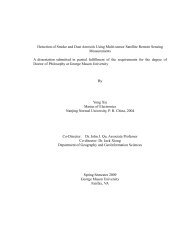Sample A: Cover Page of Thesis, Project, or Dissertation Proposal
Sample A: Cover Page of Thesis, Project, or Dissertation Proposal
Sample A: Cover Page of Thesis, Project, or Dissertation Proposal
You also want an ePaper? Increase the reach of your titles
YUMPU automatically turns print PDFs into web optimized ePapers that Google loves.
centered approach. Cluster analyses revealed six categ<strong>or</strong>izations <strong>of</strong> preschoolers, among<br />
which the Prosocial-Resilient group, similar to the Interactive Competence and positive<br />
interactive play (Coolahan et al., 2000) characterizations, held the most desirable social-<br />
emotional and verbal outcomes (Mendez et al., 2002). These results, in particular,<br />
highlighted relations between children‘s social-emotional and verbal abilities. Additional<br />
categ<strong>or</strong>izations characterized by higher verbal abilities were also characterized by high<br />
adaptability, the willingness to approach social situations, and po<strong>or</strong> self-regulation<br />
despite average teacher ratings (speculatively due to greater competence in completing<br />
structured, adult-directed versus unstructured tasks). Categ<strong>or</strong>izations marked by lower<br />
verbal abilities, however, were generally characterized by elevated classroom activity<br />
levels, po<strong>or</strong> self-regulation, and low adaptability. Among these, only the Dysregulated<br />
group demonstrated a lack <strong>of</strong> competent play with peers (Mendez et al., 2002). These<br />
findings indicate that verbal abilities, in particular, are related to social-emotional<br />
competence and classroom behavi<strong>or</strong>s fav<strong>or</strong>ing academic perf<strong>or</strong>mance (e.g., average<br />
activity levels).<br />
Longitudinal research has identified social-emotional competence outcomes, and<br />
particularly prosocial behavi<strong>or</strong>s, that f<strong>or</strong>etell later academic success within samples <strong>of</strong><br />
mixed socio-economic status (Caprara, Barbaranelli, Past<strong>or</strong>elli, Bandura, & Zimbardo,<br />
2000) and socio-economically disadvantaged children (Miles & Stipek, 2006). Results<br />
from socio-economically disadvantaged samples revealed that teacher-rated prosocial<br />
behavi<strong>or</strong> in kindergarten was positively c<strong>or</strong>related with third-grade literacy skills, and<br />
teacher-rated prosocial behavi<strong>or</strong> in third grade was positively c<strong>or</strong>related with fifth-grade<br />
39



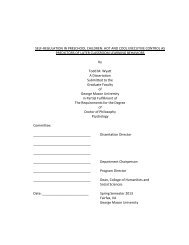
![[Sample B: Approval/Signature Sheet] - George Mason University](https://img.yumpu.com/21978828/1/190x245/sample-b-approval-signature-sheet-george-mason-university.jpg?quality=85)
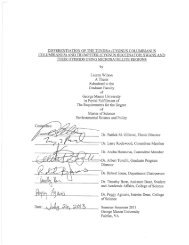
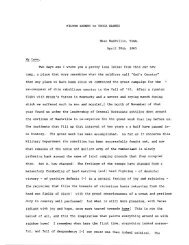
![[Sample B: Approval/Signature Sheet] - George Mason University](https://img.yumpu.com/18694905/1/190x245/sample-b-approval-signature-sheet-george-mason-university.jpg?quality=85)
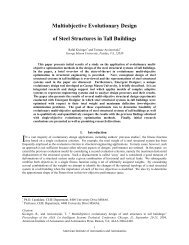
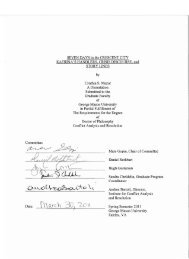
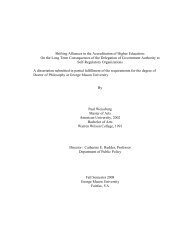
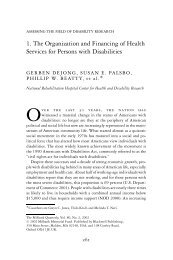
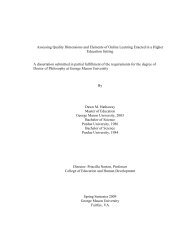
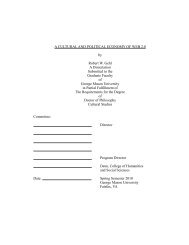
![[Sample B: Approval/Signature Sheet] - George Mason University](https://img.yumpu.com/18694552/1/189x260/sample-b-approval-signature-sheet-george-mason-university.jpg?quality=85)
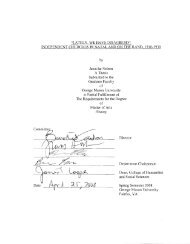
![[Sample B: Approval/Signature Sheet] - George Mason University](https://img.yumpu.com/18694474/1/190x245/sample-b-approval-signature-sheet-george-mason-university.jpg?quality=85)
